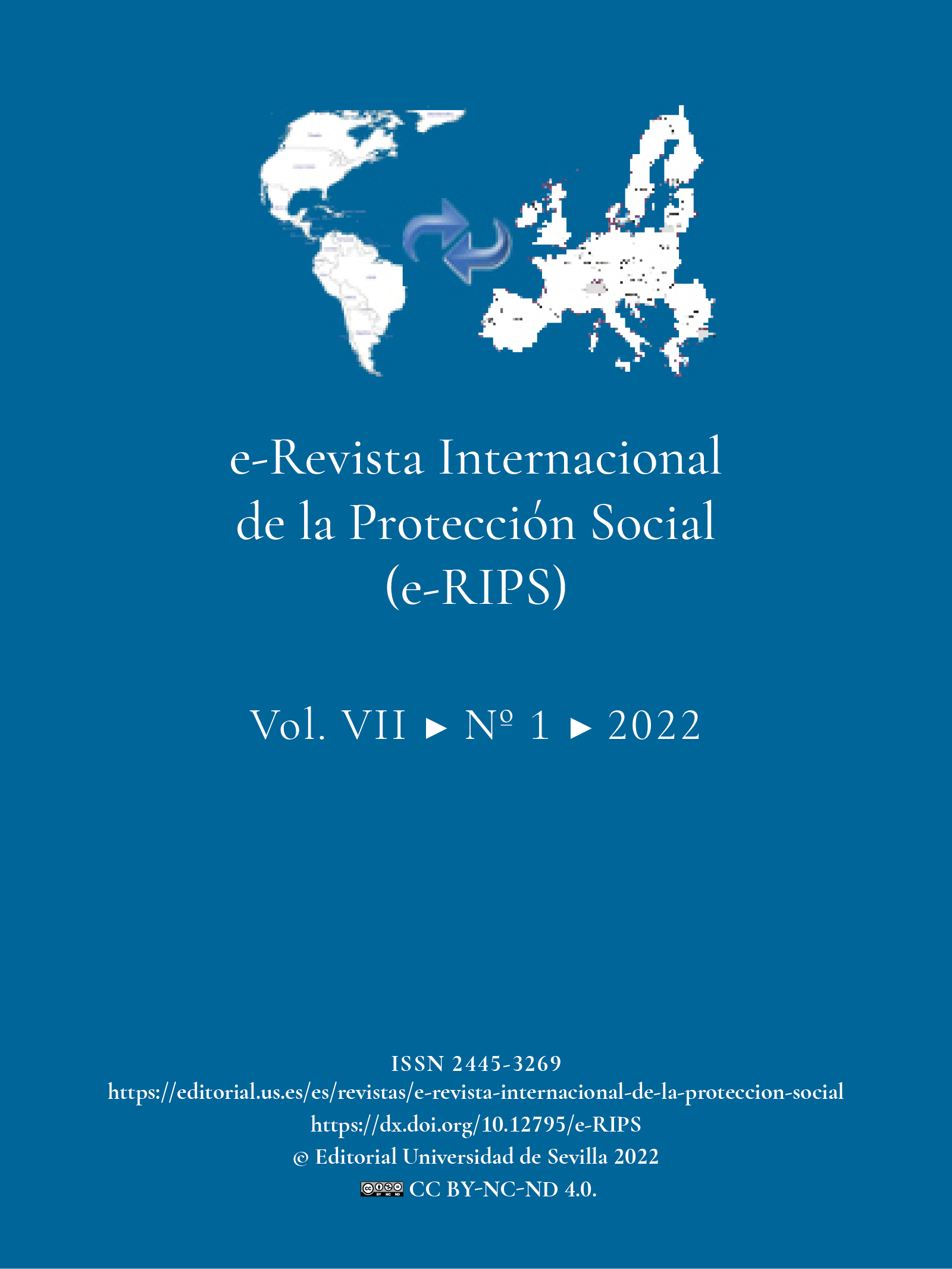La configuración del algoritmo digital, vacíos de justicia y principales desafíos para el Derecho del Trabajo
DOI:
https://doi.org/10.12795/e-RIPS.2022.i01.02Palavras-chave:
Algoritmos, Tecnologías, Trabajo, JusticiaResumo
El mundo del trabajo se está transformando de forma constante, fundamentalmente debido a la incorporación de las nuevas tecnologías de la información y de la comunicación. De entre las mismas, las empresas recurren cada vez más frecuentemente al uso de algoritmos digitales de diversa índole –ofertas de trabajo, acceso al empleo, diferencias en las condiciones laborales, formas de medición del rendimiento, entre otros aspectos–. Sin embargo, en el proceso de aprendizaje de la maquinaria, siguen existiendo sesgos sociales que continúan perennes en la sociedad.
Por consiguiente, en este estudio, trataremos de profundizar en los posibles vacíos de justicia que en la actualidad presentan los algoritmos digitales aplicados en el ámbito del trabajo, aportando posibles propuestas de mejora para la consecución de un algoritmo orientado hacia la consecución de la justicia desde una perspectiva amplia y relacional.
Downloads
Referências
Aragüez Valenzuela, L.: “Comentario crítico al Real Decreto-Ley 9/2021, de 11 de mayo, para garantizar los derechos laborales de las personas dedicadas al reparto en el ámbito de plataformas digitales”, Revista de privacidad y derecho digital, vol. 6, núm. 22, 2021.
Aragüez Valenzuela, L.: “Los algoritmos digitales en el trabajo: brechas y sesgos”, Revista Internacional y Comparada de Relaciones Laborales y Derecho del Empleo, vol. 9, núm. 4, 2021.
Azuaje Pirela M. y Finol González D.: “Transparencia algorítmica y la propiedad intelectual e industrial: tensiones y soluciones”, Revista La Propiedad Inmaterial, núm. 30, 2020 (DOI: https://doi.org/10.18601/16571959.n30.05).
Bach Gibert, A.: “Los sistemas de evaluación de trabajadores basados en las valoraciones de los clientes”, IUSLabor, núm. 3, 2019 (DOI: https://doi.org/10.31009/IUSLabor.2019.i03.01).
Becerra J. et al.: Derecho y big data, Universidad Católica de Colombia, Bogotá, 2018.
Benítez Eyzaguirre L.: “Ética y transparencia para la detección de sesgos algorítmicos de género”, Estudios sobre el Mensaje Periodístico, núm. 25 (3), 2019 (DOI: https://doi.org/10.5209/esmp.66989).
Caro Gándara, R.: “Reconstrucción de la justicia contractual desde la justicia relacional”, Recerca, Revista De Pensament I Análisi, núm. 14, 2014.
Castelblanco Gómez, W.: Algoritmos que discriminan: Derechos Humanos e Inteligencia Artificial, Universidad Católica de Colombia, Bogotá, 2021.
Eguíluz Castañeira, J. A.: “Desafíos y retos que plantean las decisiones automatizadas y los perfilados para los derechos fundamentales”, Estudios de Deusto: Revista de Derecho Público, vol. 68, núm. 2, 2020 (DOI: https://doi.org/10.18543/ed-68(2)-2020pp325-367).
Gómez Salado, M. Á. y Aragüez Valenzuela, L. (dirs.): Estudios sobre la mujer trabajadora y su protección jurídica, Laborum, Murcia, 2019.
Lyons K.: “Facebook’s ad delivery system still has gender bias, new study finds”, The Verge, 2021, disponible en https://www.theverge.com/2021/4/9/22375366/facebook-ad-gender-bias-delivery-algorithm-discrimination.
Márquez Prieto, A.: “Justicia relacional: economía y trabajo”, Revista Acontecimiento: órgano de expresión del Instituto Emmanuel Mounier, núm. 104, 2012.
Márquez Prieto, A.: “Justicia relacional: enfoque, línea y método”, en Márquez Prieto A. (dir.): Justicia Relacional y Principio de Fraternidad, Thomson Reuters-Aranzadi, Cizur Menor, 2017.
Márquez Prieto, A.: “La justicia relacional como círculo virtuoso”, Recerca, Revista De Pensament I Análisi, núm. 14, 2014.
Pandey A. y Caliskan A.: “Disparate Impact of Artificial Intelligence Bias in Ridehailing Economy’s Price Discrimination Algorithms”, en AA.VV.: AIES ’21. Proceedings of the 2021 AAAI/ACM Conference on AI, Ethics, and Society, Association for Computing Machinery, New York, 2021.
Rivas Vallejo, P.: La aplicación de la inteligencia artificial al trabajo: su impacto discriminatorio, Aranzadi, Cizur Menor, 2020.
Publicado
Como Citar
Edição
Seção
Licença
e-Revista Internacional de la Protección Social es una revista de acceso abierto, lo que significa que todo su contenido está disponible gratuitamente para el usuario o su institución. Los usuarios pueden leer, descargar, copiar, distribuir, imprimir, buscar o enlazar con el texto completo de los artículos, o utilizarlos para cualquier otro fin lícito, sin solicitar permiso previo al editor o al autor. Esta definición de acceso abierto se ajusta a la Iniciativa de Acceso Abierto de Budapest (BOAI).
 4.0
4.0
A menos que se indique lo contrario, todo el contenido de la edición electrónica se distribuye bajo una " licencia internacional Creative Commons Atribución-Nocomercial-Compartirigual 4.0 Internacional". Puede consultar la versión informativa y el texto legal de la licencia aquí. Esto debe indicarse expresamente de esta manera cuando sea necesario.
En caso de aceptación del manuscrito, los autores ceden los derechos de la obra para su publicación a eRIPS. Revista Internacional de la Protección Social bajo el contrato de licencia Reconocimiento-NoComercial-CompartirIgual 4.0 Internacional (CC BY-NC-SA 4.0). Los autores conservan los derechos de autor y terceros están autorizados a compartir y adaptar la obra, siempre que cumplan con los términos y condiciones establecidos en la licencia.
- Usted debe dar crédito de manera adecuada , brindar un enlace a la licencia, e indicar si se han realizado cambios . Puede hacerlo en cualquier forma razonable, pero no de forma tal que sugiera que usted o su uso tienen el apoyo de la licenciante.
- Usted no puede hacer uso del material con propósitos comerciales .
- Si remezcla, transforma o crea a partir del material, debe publicar sus contribuciones bajo la misma licencia que el original.
Se puede encontrar más información en https://creativecommons.org/licenses/by-nc-sa/4.0/deed.es
Se permite y recomienda a los autores/as difundir su obra a través de Internet (p. ej.: en archivos telemáticos institucionales o en su página web) antes y durante el proceso de envío, lo cual puede producir intercambios interesantes y aumentar las citas de la obra publicada.











